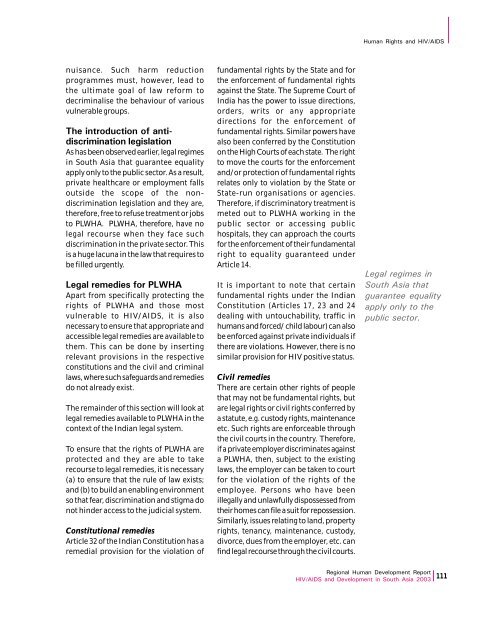Download Report - UNDP Asia-Pacific Regional Centre - United ...
Download Report - UNDP Asia-Pacific Regional Centre - United ...
Download Report - UNDP Asia-Pacific Regional Centre - United ...
Create successful ePaper yourself
Turn your PDF publications into a flip-book with our unique Google optimized e-Paper software.
Human Rights and HIV/AIDSnuisance. Such harm reductionprogrammes must, however, lead tothe ultimate goal of law reform todecriminalise the behaviour of variousvulnerable groups.The introduction of antidiscriminationlegislationAs has been observed earlier, legal regimesin South <strong>Asia</strong> that guarantee equalityapply only to the public sector. As a result,private healthcare or employment fallsoutside the scope of the nondiscriminationlegislation and they are,therefore, free to refuse treatment or jobsto PLWHA. PLWHA, therefore, have nolegal recourse when they face suchdiscrimination in the private sector. Thisis a huge lacuna in the law that requires tobe filled urgently.Legal remedies for PLWHAApart from specifically protecting therights of PLWHA and those mostvulnerable to HIV/AIDS, it is alsonecessary to ensure that appropriate andaccessible legal remedies are available tothem. This can be done by insertingrelevant provisions in the respectiveconstitutions and the civil and criminallaws, where such safeguards and remediesdo not already exist.The remainder of this section will look atlegal remedies available to PLWHA in thecontext of the Indian legal system.To ensure that the rights of PLWHA areprotected and they are able to takerecourse to legal remedies, it is necessary(a) to ensure that the rule of law exists;and (b) to build an enabling environmentso that fear, discrimination and stigma donot hinder access to the judicial system.Constitutional remediesArticle 32 of the Indian Constitution has aremedial provision for the violation offundamental rights by the State and forthe enforcement of fundamental rightsagainst the State. The Supreme Court ofIndia has the power to issue directions,orders, writs or any appropriatedirections for the enforcement offundamental rights. Similar powers havealso been conferred by the Constitutionon the High Courts of each state. The rightto move the courts for the enforcementand/or protection of fundamental rightsrelates only to violation by the State orState-run organisations or agencies.Therefore, if discriminatory treatment ismeted out to PLWHA working in thepublic sector or accessing publichospitals, they can approach the courtsfor the enforcement of their fundamentalright to equality guaranteed underArticle 14.It is important to note that certainfundamental rights under the IndianConstitution (Articles 17, 23 and 24dealing with untouchability, traffic inhumans and forced/ child labour) can alsobe enforced against private individuals ifthere are violations. However, there is nosimilar provision for HIV positive status.Civil remediesThere are certain other rights of peoplethat may not be fundamental rights, butare legal rights or civil rights conferred bya statute, e.g. custody rights, maintenanceetc. Such rights are enforceable throughthe civil courts in the country. Therefore,if a private employer discriminates againsta PLWHA, then, subject to the existinglaws, the employer can be taken to courtfor the violation of the rights of theemployee. Persons who have beenillegally and unlawfully dispossessed fromtheir homes can file a suit for repossession.Similarly, issues relating to land, propertyrights, tenancy, maintenance, custody,divorce, dues from the employer, etc. canfind legal recourse through the civil courts.Legal regimes inSouth <strong>Asia</strong> thatguarantee equalityapply only to thepublic sector.<strong>Regional</strong> Human Development <strong>Report</strong>HIV/AIDS and Development in South <strong>Asia</strong> 2003 111
















